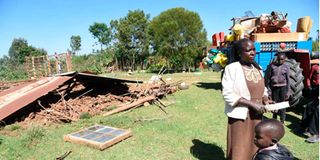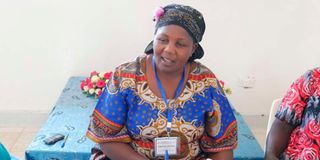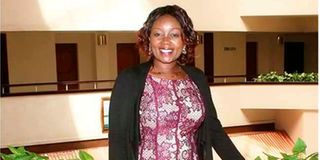Widows: The invisible women with invisible problems

Rose Rotich, a widow and mother of six ponders her next move after she was kicked out of her home in Kapsoen village in Moiben, Uasin Gishu County in a land tussle with her brother-in-law.
What you need to know:
- Today is the International Widows’ Day, an event marked with a reflection of the darkness hovering over the at least 258 million widows globally.
- One in 10 of these women live in extreme poverty.
- This year's theme is Invisible Women, Invisible Problems.
Today is International Widows’ Day with this year's event being marked with a reflection of the darkness that hovers over the at least 258 million widows globally. One in 10 of these women live in extreme poverty.
There are no official figures of widows in Kenya, but the Loomba Foundation puts their numbers at eight million. They face many social and cultural challenges that directly cut them off from accessing economic and political opportunities, hence condemning them to pitiable living conditions together with their children.
As we recognise them on this day under the theme Invisible Women, Invisible Problems, we speak to some of them and stakeholders, on their take regarding the theme.
Ms Jackline Odhiambo, founder of Nyanam International, an organisation that empowers widows in Nyanza region

Jackline Odhiambo of Nyanam International, an NGO that equips widows in Kisumu and Siaya counties holds an award she won for her contribution to public service.
“The theme points to the widows’ invisibility in the legal framework, data collection and research.
Look at the law of succession, when a widow remarries, she loses life interest over her late husband’s property. But that right is consistent with the widower.
Again, the discussions about the right of the widow to remarry are silent. In the Nyanza region, for instance, the women are being condemned to sexual cleansing. They lose their dignity upon the death of their husbands. They are forced to undergo the inhumane and demeaning ritual in order to be considered clean once again. What does that mean? She has no right to remarry until she is cleansed, but do men go through the same rites?
Times have also changed. The brother-in-laws and cousins who were culturally justified to inherit the widows no longer want to be associated with the practice. Sexual cleansing has now turned into a commercial activity. The men who sleep with the widows to ostensibly purify them demand money from them.
Then you move to their status in data collection. The Census by Kenya National Bureau of Statistics does not capture any details about the widows. Clearly, you cannot address challenges facing the widows without any information about their day-to-day experiences.
Even at the research level by the academia whose findings inform policy development and empowerment interventions, the widows are invisible.
They are grouped together with divorcées, yet their experiences are distinct. Let us be conscious of the fact that widows exist and their voices must be heard and their problems addressed.”
Tabitha Adhiambo, a widow

Tabitha Adhiambo, a widow from Osiri village in Kisumu West Sub-county, Kisumu County.
“Why are we excluded from the cash transfers? When we go to register for the fund, we are told only the orphans qualify. But widows stay with these orphans.
How are we supposed to raise children when we are disinherited and left with absolutely nothing? The government must recognise that we are a distinct group with distinct problems that need to be addressed now, not tomorrow.
Why can’t we have a policy that protects the orphans’ right to education? For instance, say a widow has been left with six children. The policy can provide that the government fully educates the four while the widow covers the two.”
Dianah Kamande, widow and founder, Cometogether Widows and Orphans Organisation

Dianah Kamande, a mother of two and the founder of a widows and orphans non-governmental organisation.
“Widows are disinherited and then abused. They are then threatened to silence by their perpetrators. If they are silent, how will the world know their problems?
They are not telling us that they are forced to marry off their daughters as a way of protecting them.
They will not tell us that they must consider surrendering their children to human traffickers who promise to offer their starving child a meal. They will not tell us of the land taken away by their abusers, where they farmed and housed their children.
They will not tell us about the education their children are not receiving. They will not tell us. So yes, their problems are invisible because widows are not talking.”





